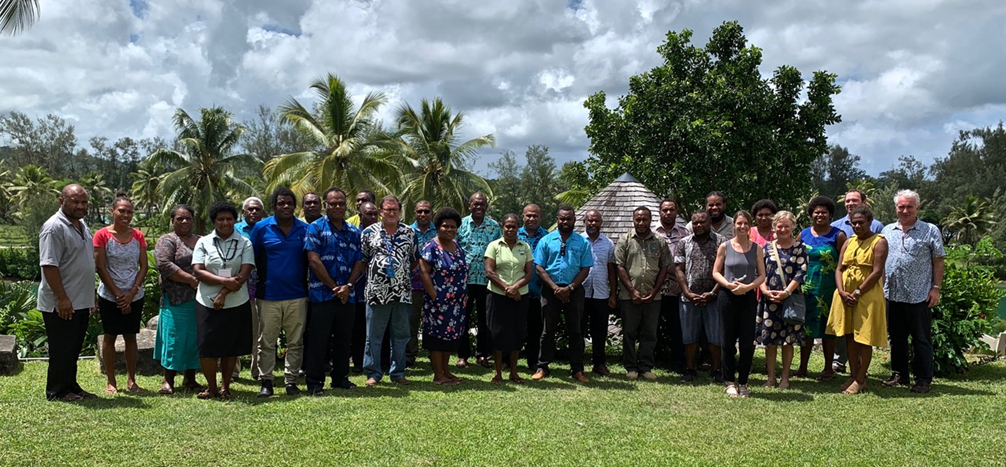The Vanuatu Coastal Adaptation Project (VCAP) phase 2 will focus on bio-diversity, environmental conservation and climate adaptation activities in Vanuatu once it begins to implement its activities at the beginning of next year 2021. These areas of focus were decided and finalized during its first inception workshop held in March 2020 as part of its design phase. This workshop took stakeholders from the national government, the Secretary Generals from six provincial government councils and representatives from the United Nations Development Programme (UNDP).

Participants from government stakeholders attending the first Inception Workshop for VCAP 2 Project in Vanuatu.
The VCAP 2 Project is worth around $12.5 million USD or about 1.5 billion Vatu in total. This project is funded by the Global Environment Facility (GEF) and the Least Developed Country Fund (LDCF) and is titled VCAP 2 or the Vanuatu Coastal Adaptation Project 2.
VCAP 2 will be housed at the Department of Climate Change under the Ministry of Climate Change and will help to strengthen government capacity to deliver services to project sites throughout Vanuatu.
Important stakeholders for this new project include agencies such as the Department of Climate Change (DoCC), the Vanuatu Meteorological and Geo-hazards Department (VMGD), the Department of Environmental Protection and Conservation (DEPC), the Department of Agriculture and Rural Development (DARD), the Department of Forestry (DoF), the Department of Livestock (DoL), the Department of Water Resources (DoWR), Vanuatu Fisheries Department (VFD), the Department of Local Authorities (DLA), and the Public Works Department (PWD).
The Inception Workshop held at the Holiday Inn marks the beginning of the project’s design phase, which is anticipated to take at least 6 months to complete. This important workshop allowed stakeholders to be familiar with project components, the project design team and to prioritize potential project activities.
This project will build off of the progress attained through VCAP 1, which the Ministry of Climate Change facilitated with stakeholders from 2015 – 2019. VCAP 1 supported community climate adaptation measures such as improving accessibility of roadways and crossings, strengthening food and water security, protecting marine and upland resources, and improving resilience of Area Council offices to function as Emergency Operations Centers in times of disaster.
VCAP 2 will differ from VCAP 1 in that much of its funding from the GEF will focus on supporting environmental resource protection and bio-diversity which is the variety of living organisms in Vanuatu. This entails the survey and establishment of terrestrial and marine protected areas, the registration of these protected areas, and implementing resource management plans with communities. Activities to protect the environment against land degradation will also be supported through the project.
As the national government is scheduled to graduate from its Least Developed Country status, VCAP 2 will be accessing LDCF financial support for the very last time. LDCF funding will be used to support early-warning systems activities through VMGD, sub-national governance support for the DLA and livelihoods support through the Ministry of Agriculture, Forestry, Fisheries, Livestock and Bio-security (MoAFFLB).
The design phase of VCAP 2 is expected to be approved by the Government for submission to the UNDP and the GEF at the end of this year and should begin implementation from 2021 – 2026. Despite the global challenges imposed by COVID-19, the project design team aims to complete field missions to potential project sites later this year including the Torres Islands, West Ambrym; Maewo, Big Bay, Santo, South Epi, and South Tanna.
The Inception Workshop also allowed stakeholders to refine its project site selection process in consideration of the National Bio-diversity Strategy and Action Plan 2018-2030 (NBSAP) as well as from a VCAP 1 Project Board Meeting in late 2019 consisting of members of the National Advisory Board (NAB) under the Ministry of Climate Change.
For more information regarding this press release please contact Director Mike Waiwai on phone: 7784330 or email:

